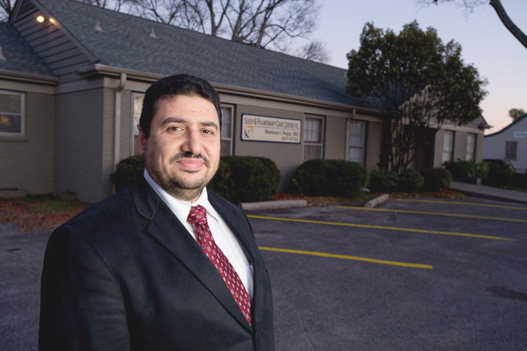
How do I know if I need a sleep study?
Speaking about your symptoms with your Primary Care Physician or Internist should be helpful and they can then refer you to Dr. Najjar. Some of the common symptoms people with sleep disorders describe are daytime sleepiness, shortness of breath at night, insomnia, fatigue, snoring, waking up gasping for air, breathing difficulties while asleep, or nighttime leg restlessness. Such symptoms may indicate the need to see a sleep specialist. You can also contact the Dr. Najjar's office directly to speak with a staff member to determine a need for further evaluation.
How do I schedule an appointment?
You can call the Dr. Najjar's office to schedule an initial appointment at 256-341-0152. If it is determined you need a sleep study to make a diagnosis this will be scheduled during the visit.
What is a sleep study?
This is a study that is conducted during the night while you are asleep. You would arrive at the sleep lab of your choice in the evening and spend the night in the lab. During this process, different body functions are measured during sleep, including brain waves, eye movements, breathing patterns, heart rate and rhythm, oxygen levels in the blood, and leg movements. These are recorded with electrodes attached to the body. The process is painless! Technicians will monitor your sleep all night and gather data. You will be awakened around 6:30 am, at which time you may go home. The data that is gathered is reviewed by the physician in detail to determine if you have a sleep disorder.
How are sleep disorders treated?
Depending on the diagnosis the management is different. If you are diagnosed with Sleep Apnea, Restless Legs Syndrome, Narcolepsy, or Insomnia the details of management will be discussed with you and medications and/or CPAP (Continuous Positive Airway Pressure) may be prescribed. If you have another condition then the management will be discussed with you in detail.
Will the costs be covered by my insurance?
Once we receive information regarding your insurance carrier, we will verify your coverage and will discuss this with you. You may have co-payments for office visits and/or the sleep study. Dr. Najjar has office locations in both Decatur and Madison to serve his patients. Please contact Dr. Najjar for all of your pulmonary and sleep medicine issues.
How Do I Use My Metered Dose Inhaler?
- Remove the cap and hold the inhaler upright
- Shake the inhaler
- Tilt your head back slightly and breathe out
- Open your mouth with inhaler 1 to 2 inches away.
- Press down on the inhaler to release the medicine as you start to breathe in slowly
- Breathe in slowly for 3 to 5 seconds
- Hold your breath for 10 seconds to allow the medicine to reach deeply into your lungs
- Repeat puffs as prescribed. Waiting 1 minute between puffs may permit the second puff to go deeper into the lungs
Cleaning Your Inhaler
Once a day, clean the inhaler and cap by rinsing it in warm, running water. Let it dry before using it again. Have another inhaler to use while it is drying.
Twice a week, wash the plastic mouthpiece with mild dishwashing soap and warm water. Rinse and dry well before putting it back.
Replacing your inhaler
Each inhaler is good for only a certain number of puffs of medication. After those puffs are used up, any puffs remaining will not give you the amount of medication you need. To be sure you'll get enough medication when you need it, keep track of how many puffs you use. Here's a tip:
- Find the number on the canister that tells you how many puffs it contains
- Divide this number by how many puffs you are told to use in one day. This gives you the number of days your medication should last
- Use your calendar to find out what date your medication will run out. Mark the date on the canister and on your calendar
Be sure to replace the inhaler before you run out of medication.
Note: Be aware that your medication will run out sooner if you use your inhaler more often than planned.

